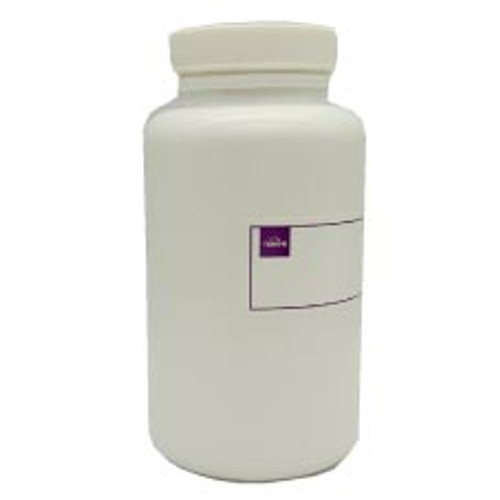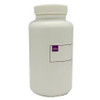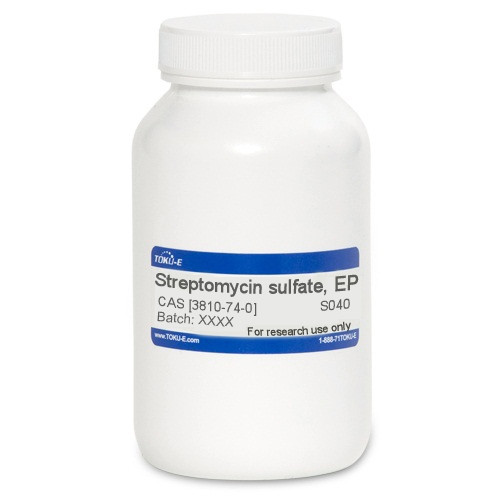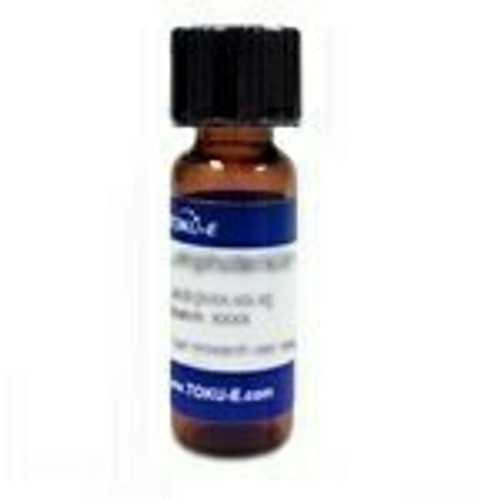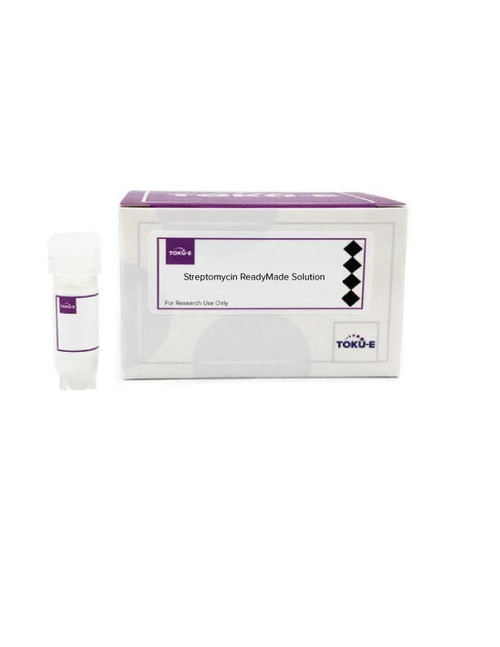Streptomycin Sulfate is a freely soluble aminocyclitol glycoside antibiotic, that was co-discovered by Salman Waksman, Albert Schatz, and Elizabeth Bugie at the Rutgers University in 1943 and was later patented in 1948. Streptomycin is isolated from Streptomyces griseus and shows bacteriostatic activity at low concentrations and bactericidal activity at higher concentrations against mycobacteria and Gram-negative bacteria. It is less active against Gram-positive bacteria. Streptomycin Sulfate has been found to be effective against certain β-lactam sensitive VRE or vancomycin resistant Enterococcus species; a glycopeptide antibiotic resistant "superbug”.
Streptomycin Sulfate is often used together with penicillin and other agents to inhibit bacterial contamination in cell culture applications. It is recommended for use in molecular biology at 25-50 μg/mL, in cell culture at 100 mg/L and in embryo culture at 50 mg/L.
Streptomycin is a protein synthesis inhibitor that acts by binding to the 30S ribosomal subunit at the S12 protein thereby inducing a misreading of the genetic code, inhibiting the initiation of translation of DNA, which then results in death for a susceptible bacterium. Streptomycin has also shown activity as a miRNA inhibitor, that is capable of down-regulating miR-21, a miRNA that is overexpressed in a wide variety of cancers.
Streptomycin Sulfate is readily water-soluble (20 mg/ml) but has low solubility in organic solvents.
Streptomycin Sulfate conforms to United States Pharmacopeia standards.
We also offer:
- Streptomycin ReadyMade Solution (S139)
| Mechanism of Action | Streptomycin is a protein synthesis inhibitor. It binds to the small 16S rRNA of the 30S subunit of the bacterial ribosome, interfering with the binding of formyl-methionyl-tRNA to the 30S subunit. This leads to codon misreading, eventual inhibition of protein synthesis and ultimately death of microbial cells through mechanisms that are still not understood. Speculation on this mechanism indicates that the binding of the molecule to the 30S subunit interferes with 50S subunit association with the mRNA strand. This results in an unstable ribosomal-mRNA complex, leading to a frameshift mutation and defective protein synthesis; leading to cell death. |
| Spectrum | Streptomycin Sulfate is highly active against Gram-negative and mycobacterium, and less active against Gram-positive bacteria. Streptomycin Sulfate has been found to be effective against certain β-lactam sensitive VRE or vancomycin resistant Enterococcus species; a glycopeptide antibiotic resistant "superbug”. |
| Microbiology Applications | Streptomycin Sulfate is commonly used in clinical in vitro microbiological antimicrobial susceptibility tests (panels, discs, and MIC strips) against Gram-positive and Mycobacterium microbial isolates. Medical microbiologists use AST results to recommend antibiotic treatment options. Representative MIC values include:
Streptomycin is commonly used for bacterial gene selection with the aadA resistance gene. Common working concentration is 50 – 100 µg⁄ml. Media SupplementsStreptomycin can be used as a selective agent in several types of isolation media: STAA Agar - STAA Selective Supplement STAA Agar - STA Selective Supplement |
| Plant Biology Applications | Streptomycin has been used iin crop protection to prevent fire blight, soft rot caused by Pectobacterium species, bacterial blight caused by Pseudomonas cichorii, fruit-spotting in apples and pears, and bacterial spot in peppers and tomatoes caused by Xanthomonas spp. (McManus et al. 2002).
|
| Eukaryotic Cell Culture Applications |
Penicillin-Streptomycin Solution (100X) and Antibiotic-Antimycotic Solution (100X) can be used preventatively to safeguard cell cultures against microbial contamination. Certain cell lines may exhibit cytotoxic effects when exposed to high concentrations of antibiotics and antimycotics. It is important to perform dose-response experiments to determine the optimal antibiotic or antimycotic concentration for your cell line. Penicillin-Streptomycin Solution (100X) is composed of penicillin (10,000 units/ml) and streptomycin (10,000 µg/ml) and is effective against gram-positive and gram-negative bacteria in eukaryotic cell culture. Antibiotic-Antimycotic Solution (100X) is composed of penicillin (10,000 units/ml), streptomycin (10,000 µg/ml), and amphotericin B (25 µg/ml) and is effective against gram-positive and gram-negative bacteria contaminations as well as yeast and other fungi. |
| Electrophoresis Applications |
When purifying protein from a biological extract, streptomycin sulfate is sometimes added as a means of removing nucleic acids. Since it binds to ribosomes and precipitates out of solution, it serves as a method for removing rRNA, mRNA, and even DNA if the extract is from a prokaryote. |
| Cancer Applications |
Streptomycin sulfate can down-regulate the levels of mature miR-21, a miRNA that is overexpressed in a wide variety of cancers and has been causally linked to cellular proliferation, apoptosis, and migration. Inhibition of mir-21 in MCF-7 breast cancer cells causes reduced cell growth. Streptomycin down-regulates miR-21 by binding to pre-miRNA (its precursor) and blocking the function of the Dicer enzyme, an essential step in miRNA maturation. |
| Molecular Formula | C21H39N7O12 · 1.5H 2SO4 |
| Solubility | Acetone: Soluble Chloroform: Soluble Water: >20 mg/mL |
| References |
Davis, Bernard D. "Mechanism of Bactericidal Action of Aminoglycosides."Microbiological Reviews 51.3 (1987): 341-50. McManus P.S., Stockwell V.O., Sundin G.W. and Jones A.L., 2002, Antibiotic use in plant agriculture. Annu. Rev. Phytopathol. 2002. 40:443–65 |
| MIC | Enterococcus faecalis| 7|| Proteus vulgaris| 12|| Pseudomonas Lachrymans| 1.5|| Ralstonia solanacearum | 5|| Salmonella typhi| 13.4|| Shigella sp.| 9|| Staphylococcus aureus| 4|| Xanthomonas vesicatoria| 5|| |

